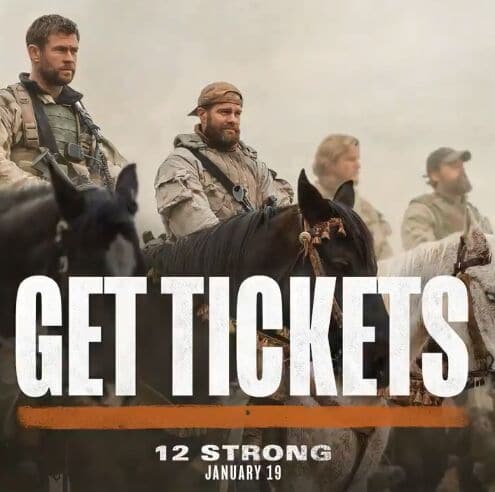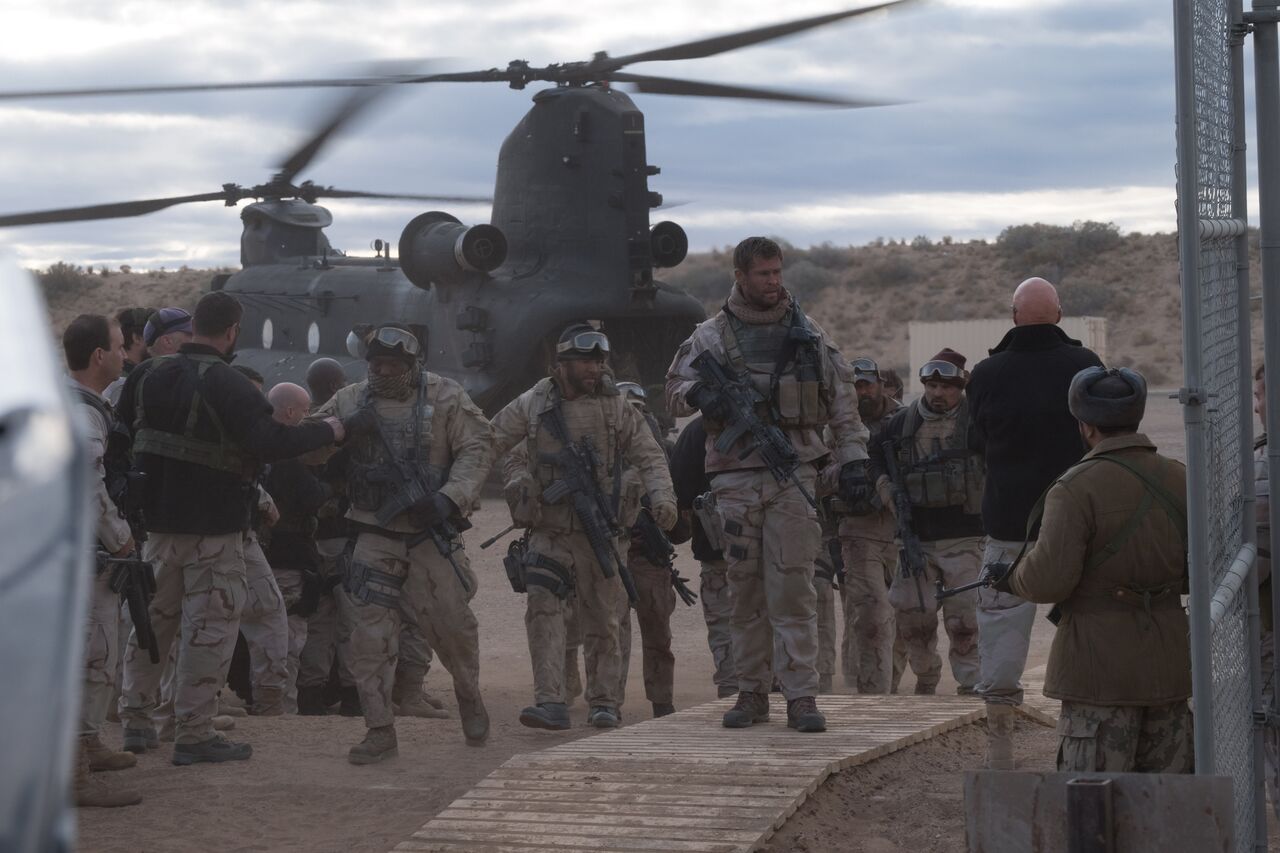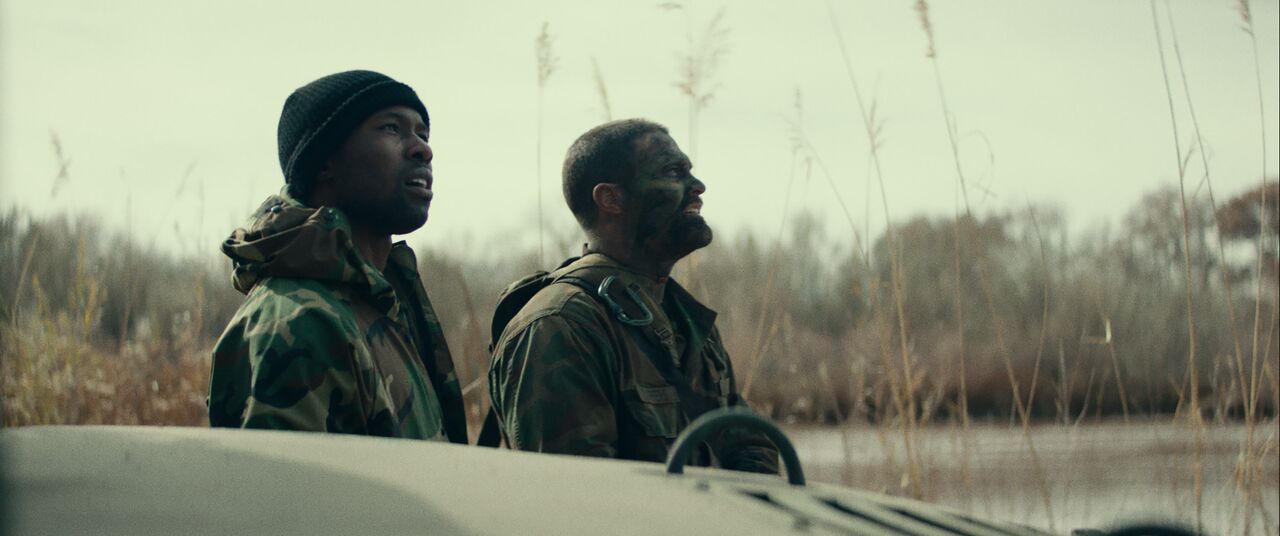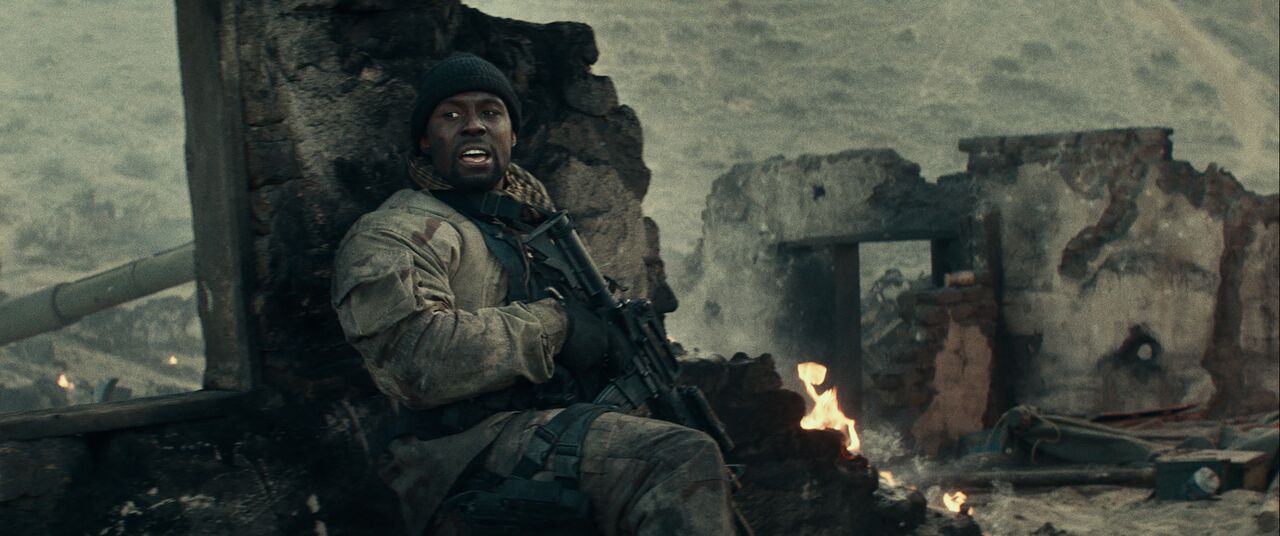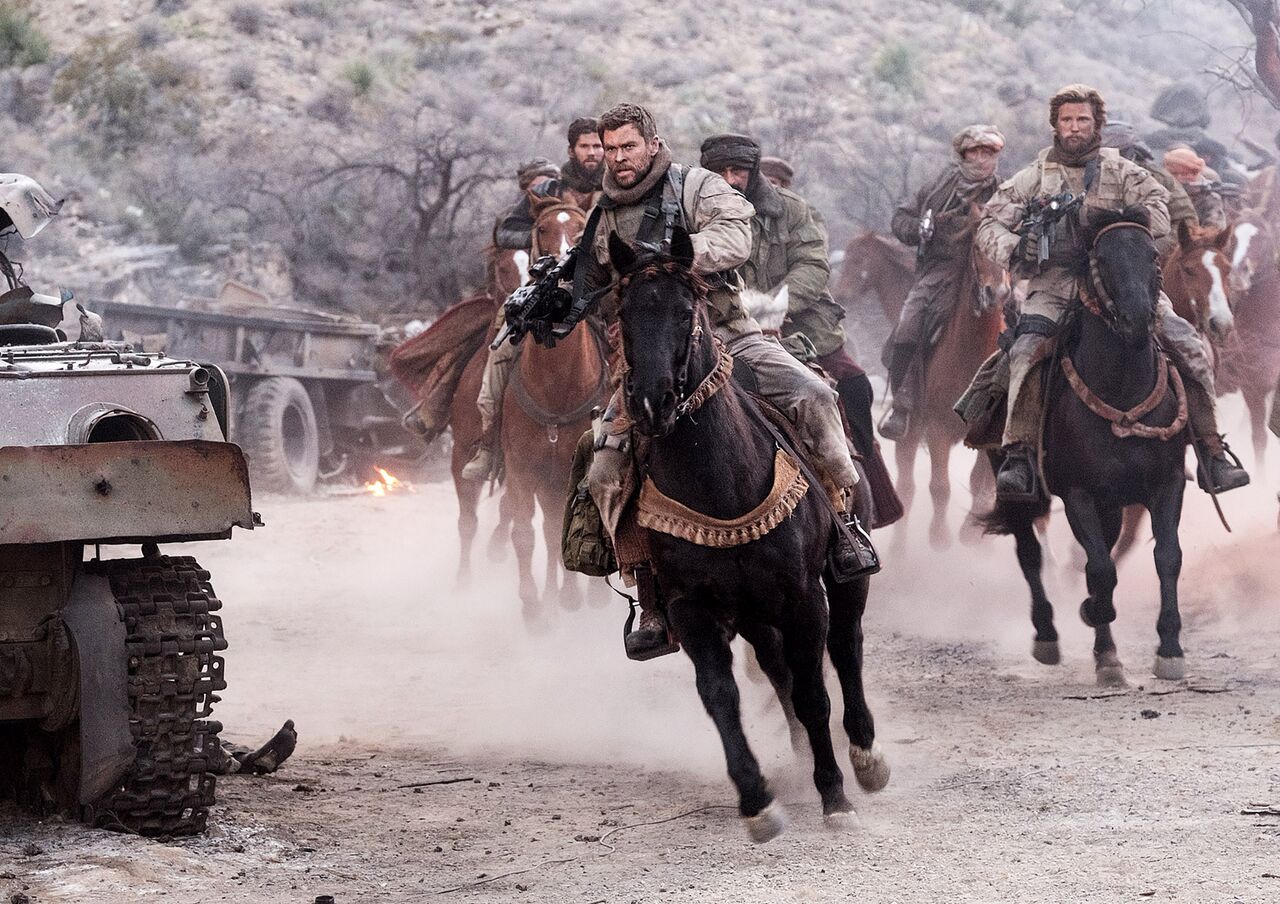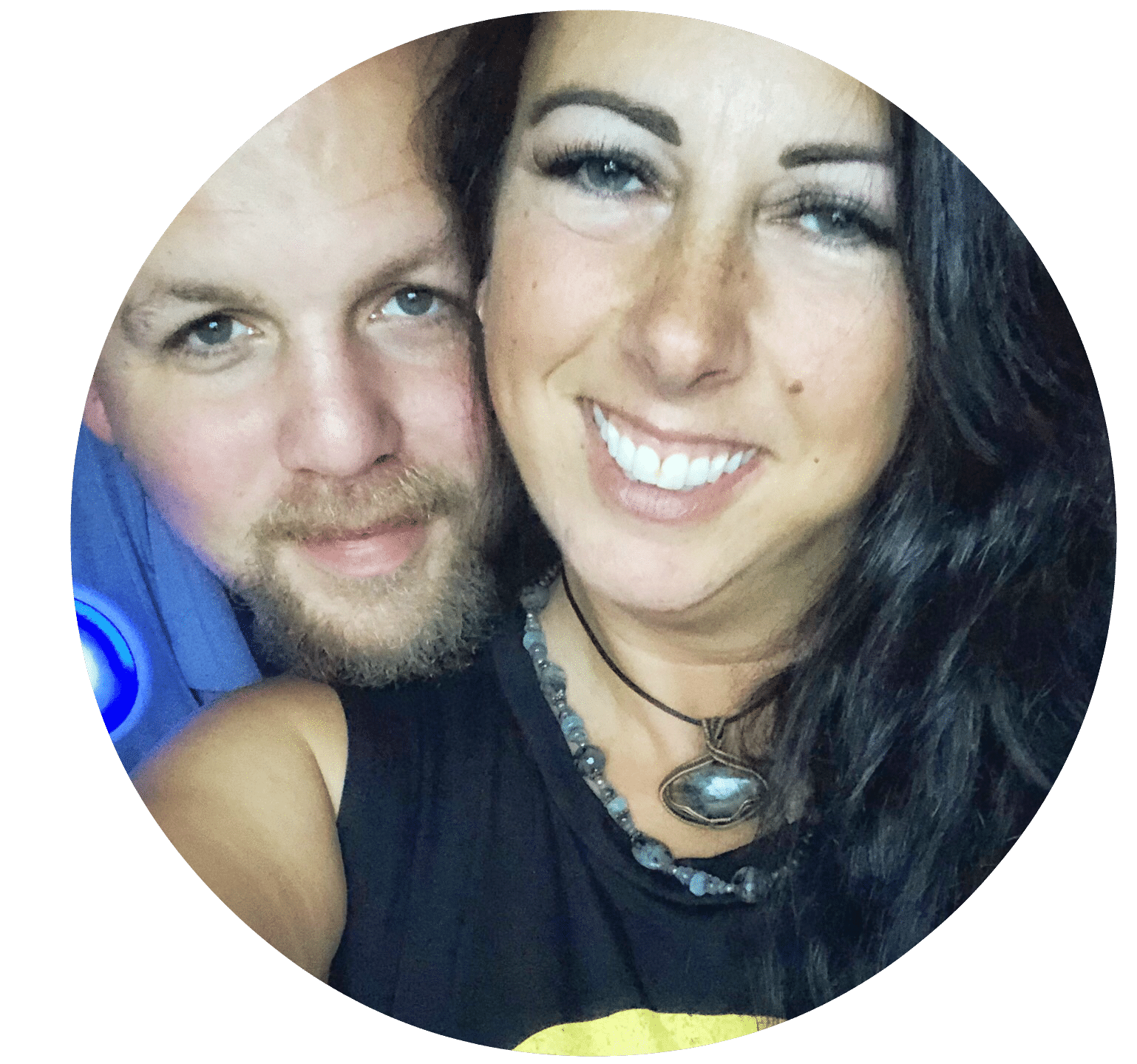Travel and accommodations were provided by Warner Bros. Pictures to attend a press junket for their new movie, “12 Strong.” #WBsponsored
You know what happened on 9/11. Discover the untold story of what happened next when 12 soldiers became the greatest heroes the world never knew… until now. “12 Strong” in theaters January 19th.
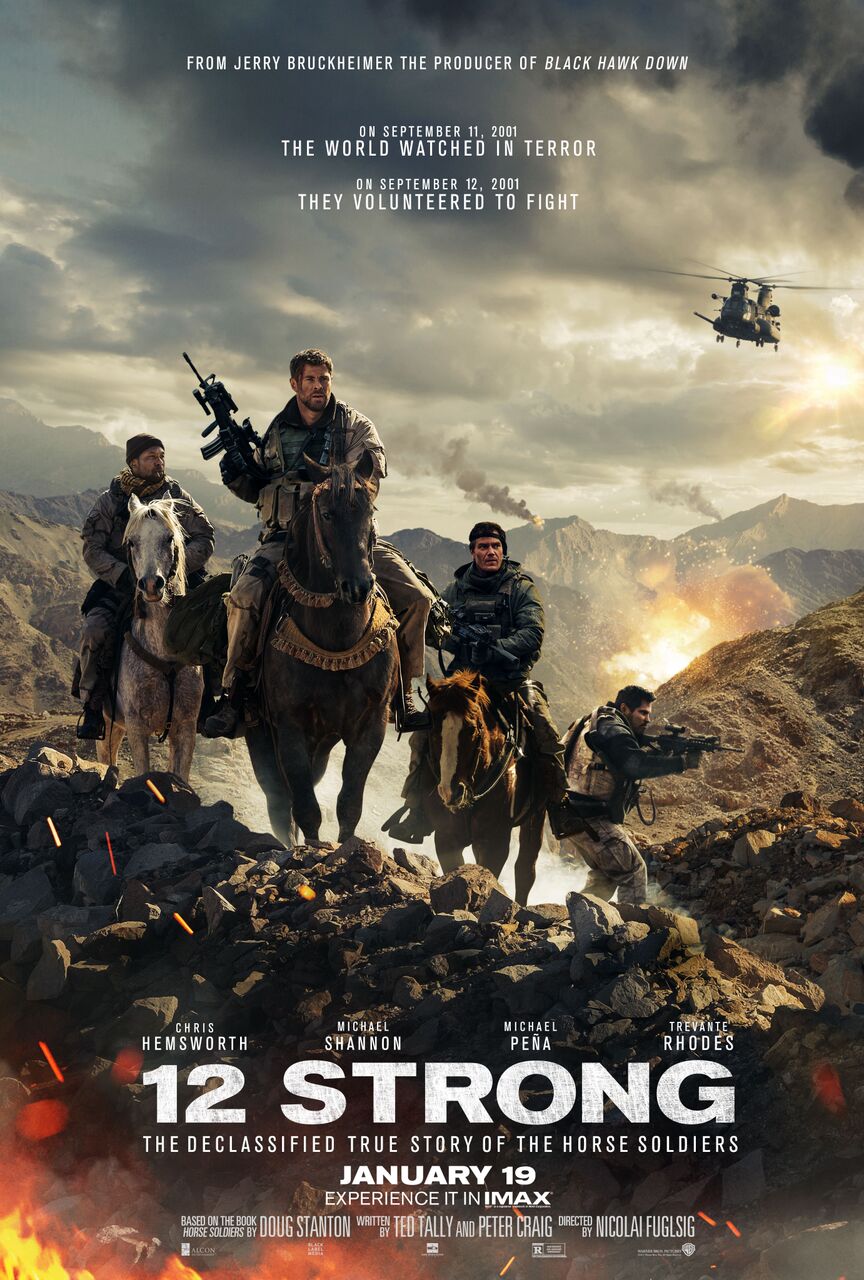
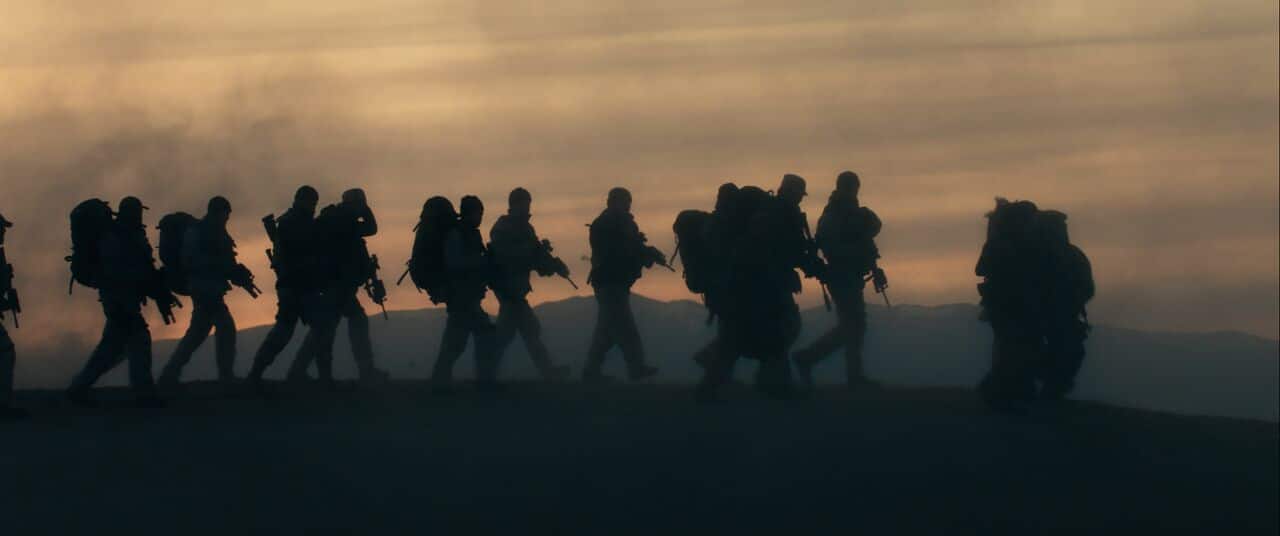
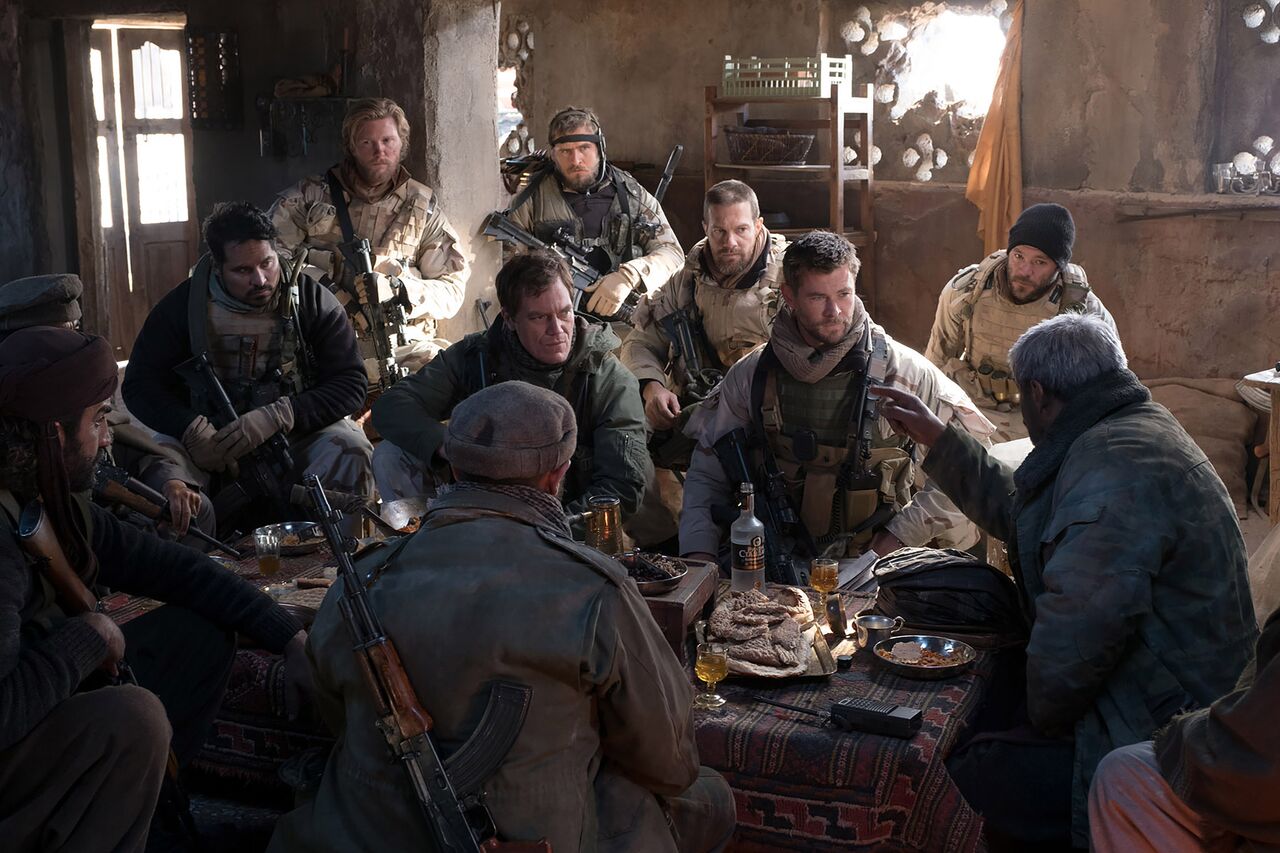
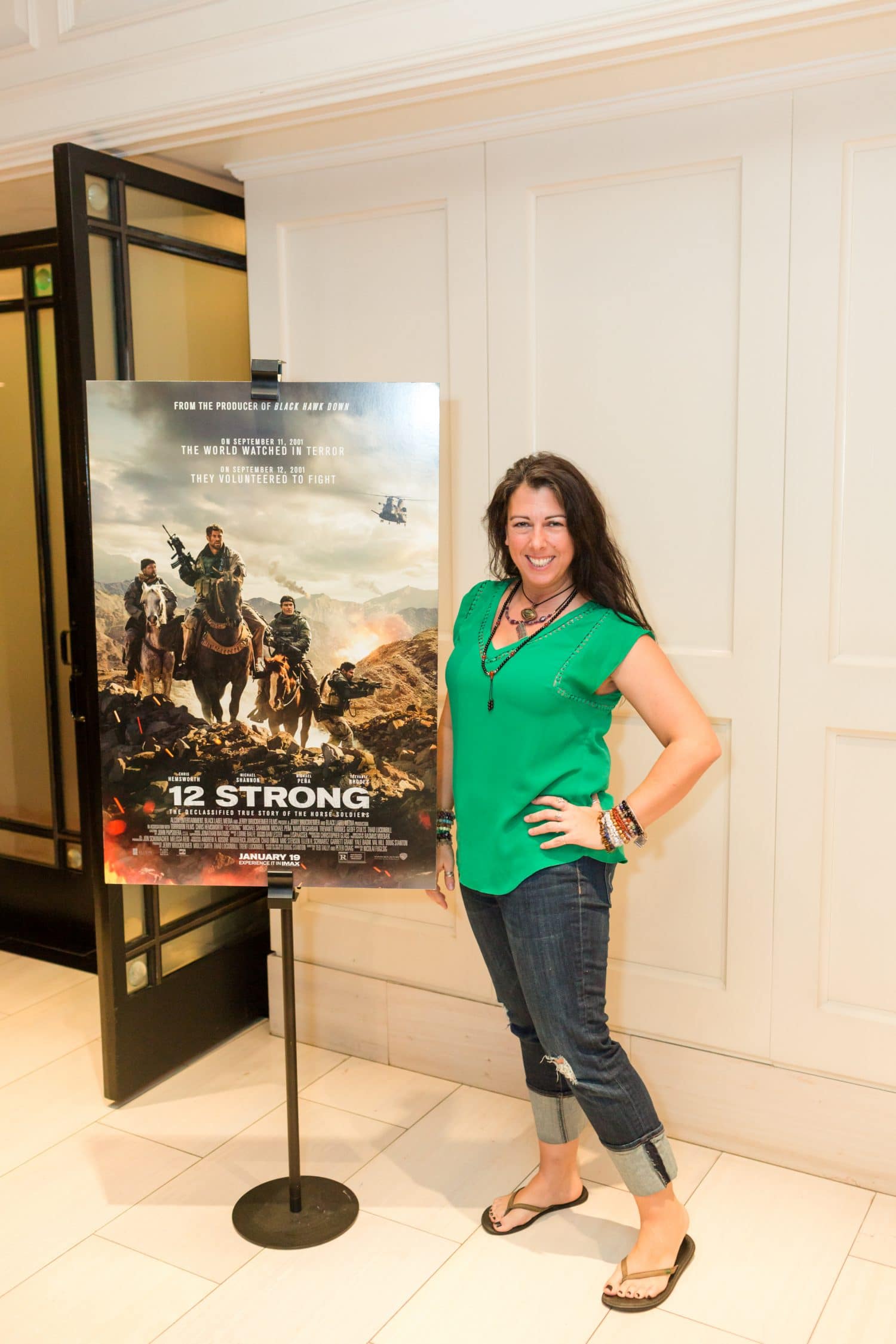
My thoughts on 12 Strong
Powerful. Gripping. Humbling. It really struck a chord within me with this quiet patriotism, one that everyone has who lived through that day, one that might not be as loud and boisterous, but the one that remembers the flags waving and the gentle strength we all had as we came together. Even to this day, closing in on two decades later, seeing 9/11 footage still sends my heart into my stomach. But watching the expert retelling of this dangerous mission by director Nicolai Fuglsig where 12 soldiers faced outgunned, outmanned, and fought a heavily armed foe and did it all on horseback in foreign territory? Spine-tinglingly awesome.
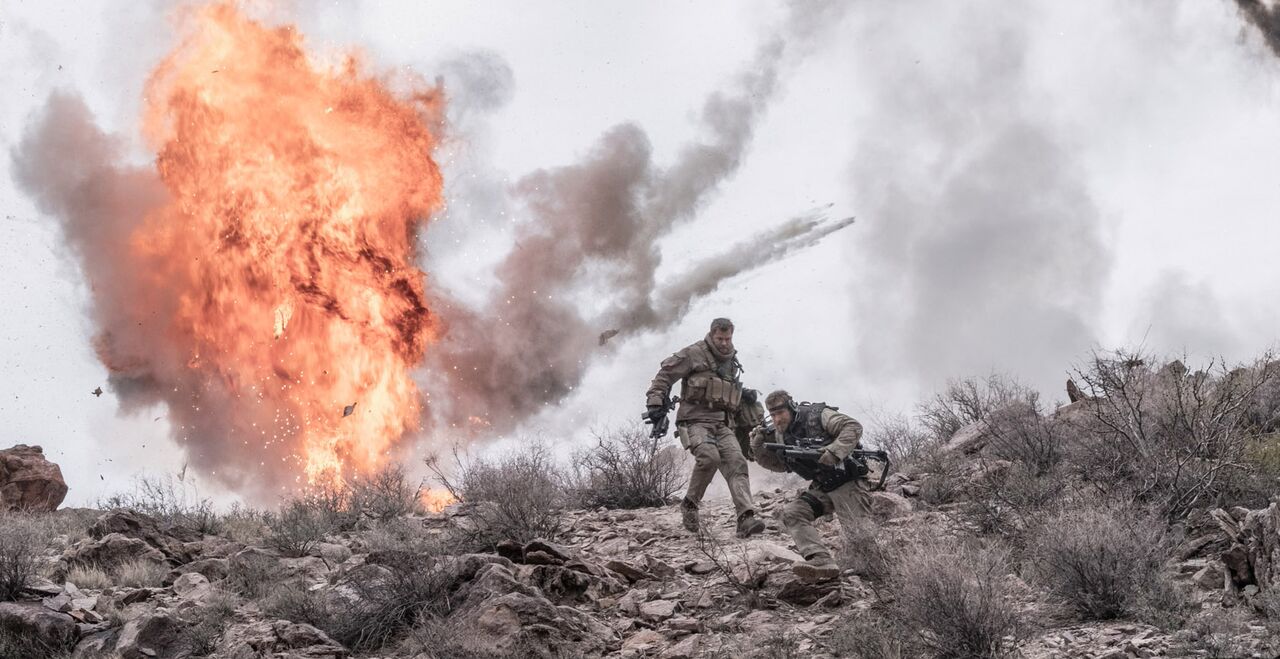
The 12 Strong Press Conference
The morning after we screened the movie, we had the opportunity to attend a press conference with other members of the press and the following cast members: Chris Hemsworth (who plays Captain Mitch Nelson,) Trevante Rhodes (who plays Ben Milo), Geoff Stults (who plays Sean Coffers), Navid Negahban (who plays General Dostum). Also attending the press conference to answer our questions were the crew members, including director Nicolai Fuglsig, producers Jerry Bruckheimer, Molly Smith, Thad Luckinbill, and book author Doug Stanton.
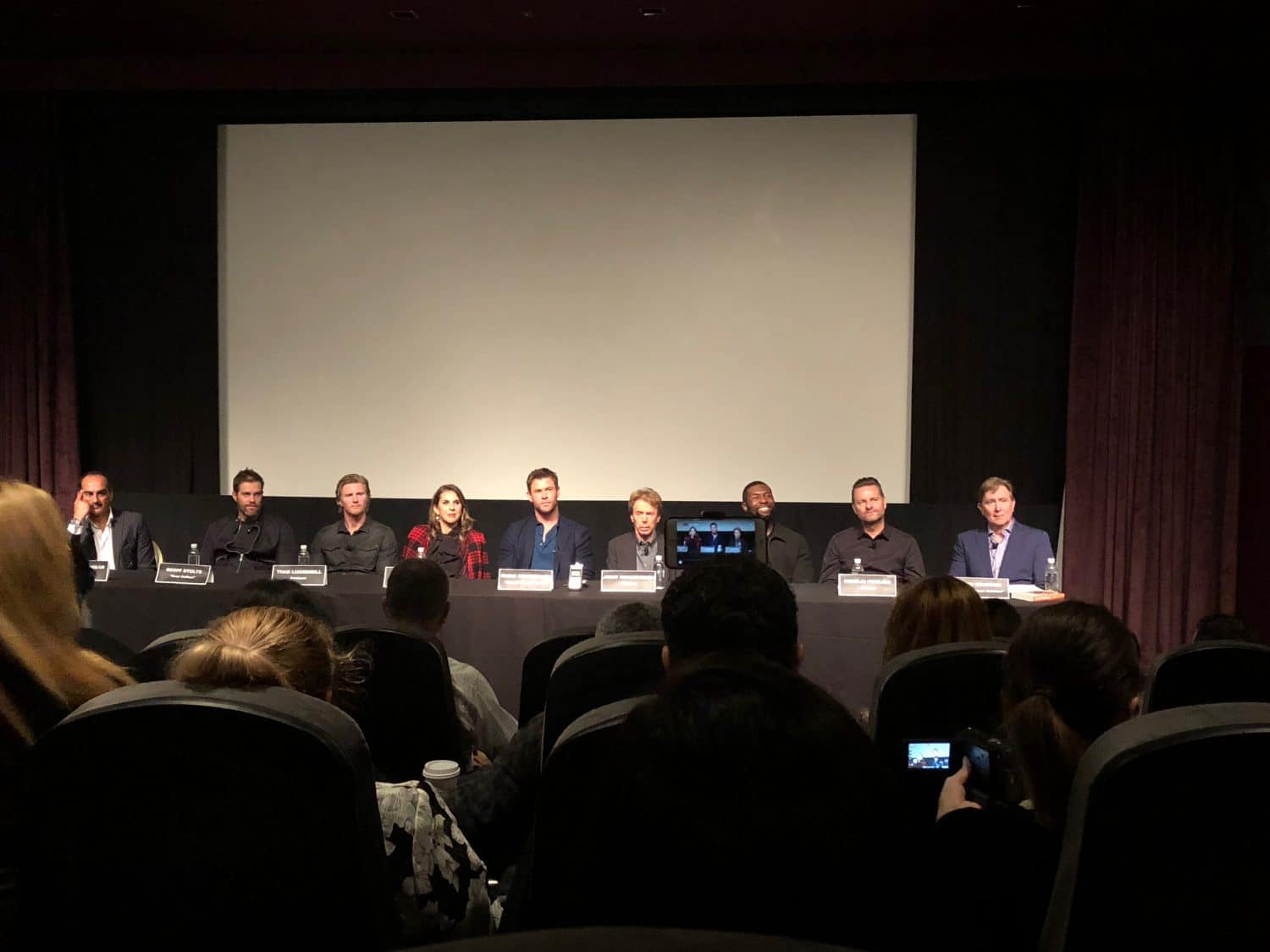
After playing super heroes in the past, what made Chris Hemsworth want to play a real life hero?
CHRIS HEMSWORTH: “I’ve done a lot of stuff sort of in the comic book world and fantasy-based sort of heroes and so on. It was a lot of fun, but desperately wanting to do something with some real heart and something more grounded and this script came along a few years ago. My first instinct was I was just– couldn’t believe it was a true story. I knew about this conflict and this war, like a lot of people, but not about this mission. And I was sort of engrossed and shocked and fascinated by the details.
Then, speaking with the real guys through the process, and there’s such an honesty and openness and a lack of sort of dramatization or ego or so on as they retell or recount these events. And such a humility, you know? And as you say, they’re the real heroes, and to put themselves in these positions and in harm’s way, with their safety in jeopardy, but for the rest of our safety, is something beyond admirable. Something that is inspiring and something that I felt an honor to be asked to play this character and be part of the story.
But I definitely felt the weight, that responsibility. I think we all did, and was very thankful that we had the real guys there. We had this amazing cast, crew, producer. We had Doug. We had the sort of resource of knowledge at our fingertips. So it was an incredible experience and one that I’ll remember for a long, long time.”
What do you want people to walk away with after watching this movie?
NAVID NEGAHBAN: “There is an expression that says ‘You can see the truth when you are blind and you can hear the truth when you are deaf.’ So if you put all the differences aside and look at the person as who the person is, then you will see how similar we are, and then you will discover our similarities, not our differences, and that’s what the world is about.
It’s about us being the same. There’s no difference, except the color, who cares? Go inside. What you find inside you is pure white, and there is no difference between the white that is inside me or anybody else who is sitting here. All of us, we are the same.”
GEOFF STULTS: “These are 12 guys that made what ended up– what could have been– they chose to make what could have been the ultimate sacrifice because of what they believed in, what they believed America stood for and what they–they left their families behind. Some guys left their families behind and they knew that there was a chance that some, if not all of them, wouldn’t come back. This is about a love for one another and a love for the ideal of what America is, and they believed that they were making a difference so that nothing like 9/11 would happen again.”
MOLLY SMITH: “Absolutely, I mean, there’s so many elements into this story, but I think something that people–we’ve seen people respond to when that they’ve screened the film is the sacrifice. There’s a line in the movie I love so much where it says–Michael Shannon says, ‘How do you love your family and leave them to go to war?’
And I think that’s such a poetic, beautiful line, because people do this every day, and they make sacrifices for their country, the camaraderie, the love, it’s their duty, and I think we really tried to capture the spirit of the military, all branches of the military, and soldiers in general. You know, by showing some of the layers and complexities of the home life and their families, and then, of course, seeing the scope of what these guys went to go do because they felt a sense of duty to fight for their country.”
JERRY BRUCKHEIMER: “I think that these men don’t see themselves as heroes. They’re just doing their jobs. That’s what they’re trained to do. They do it because they love their country, they love their families, and their professionals, and they’re highly trained, they’re highly intelligent and they’re deadly.
And the fact that they went into this country and bonded with the Afghan people, and you have to understand that there’s so many different tribes, and they all–they show it in the movie, where they all fight amongst each other, and the fact that this group of 12 men got in there and got them all to work together against a common foe, which is so interesting, and it all comes down to our military and how well-trained these men are, and they don’t see it as sacrifice.
They see it as something that that’s their job. That’s what they’re trained to do. And they’re so good at it, and we’re very fortunate that we could show their excellence in this movie and, thanks to Doug, who found this story, and I think you should tell them how you found the story because this was classified.
We would never know about this story had it not been for Doug digging in when he ran into a soldier who started telling him about this classified mission that he couldn’t talk about. And so that’s so interesting, and this is just one mission. There’s so many others that we know nothing about that they’ve done. What happened right after 9/11 is President Bush went to his military and said, ‘We have to root out this evil, and how can we do it?’ And the military advisors said, ‘Well, it’s going to take us at least six months to put a force over there.’
And he said, ‘That is not acceptable. Tell me another way.’ And they went to, I guess, George Tenet who was the head of the CIA at the time, and he went to–one of his operatives, this CIA agent, and he said, ‘I want you to get in there.’ He put his hand on a map and he said, “I want these five provinces. I’m not going to ask any questions, just get it done.’ It just shows you what a small force can do, and how good they are at their job.”
TREVANTE RHODES: “I hope that people take away the identity, that connectivity, love, camaraderie, brotherhood, sisterhood, you know? Just I guess basically to relay what everybody else was saying. Just loving and being open and connecting with people, and perspective and understanding.
Because my understanding of what anybody, in all honesty, from the Middle East, was after this event was anybody from the Middle East is bad, which is so ignorant, you know what I mean? So to have the opportunity to read this story and be a part of this story, that shows the truth. And yes, again, and it was amazing. Thank you, thank you, thank you. And that’s what I hope that people take away from the film.”
NICOLAI FUGLSIG: “I think in a way, to sum up, I think it’s an homage to the human spirit, you know? I mean, both on the Afghan and American side, all these heroes were just ordinary people, and it could be a friend, your neighbor, and under extreme circumstances, they all rose to the extraordinary, you know?”
How did you train for the movie? Particularly given the terrain where you shot the film was mountainous?
CHRIS HEMSWORTH: “Walking up the hill, my lungs were burning. It was funny. We had these little gator trucks that would be whipping people up and down the hill, and occasionally be like, ‘Ah, it’s cool, I’ll run up there.’ And within, like, three steps, you know, the mountain is like this and you’ve got all your gear on and the altitude, and it was like, ‘Bring the truck back!’ (laugh from the press)
So yes, we’re in incredible peak condition. I couldn’t walk up the hill. No, we did, what is it? Three, four weeks of military training. You know, weapons training, and for me that was the most important thing. That was more the sort of chemistry and bond that we formed.
I mean, obviously that sort of technical side of things was an absolute must, but it’s tricky to fake that sort of connective tissue that links all the exposition and so on at times together. And all the little kind of moments and jokes and beats in between the bigger scenes was just because of the contribution of all the guys and our friendship that we’d formed in that training.”
You talk about military training, but that usually doesn’t include horses. How was all that? I mean, you all were really riding, right?
CHRIS HEMSWORTH: “Yes.”
THAD LUCKINBILL: “No stuntmen at all, actually.”
NAVID NEGAHBAN: “I think it was the first week that we were rehearsing. I used to ride horses, so I said, ‘Okay.’ I go there. I forgot how old I am, so I go back from the horse, and the very first week, I’ll never forget I was riding, then it went into a gallop and my trainer was telling me, ‘Don’t gallop. Don’t gallop.’
I’m turning around to talk to him and all of a sudden the horse is up in the air, jumping over the bush. I didn’t know what to do. I came back and that was it. For two weeks, I was working like this. (laugh from press) But when we were shooting the movie with the guys, they had to help me to get off the horse and on the horse. It was good. It was good training.”
How was it shooting this film in the desert? Can you talk a little bit about working in that kind of cruel environment?
NICOLAI FUGLSIG: “You know, it was always important for me to try and portray Afghanistan in the most accurate way, and we’ve seen so many movies that we, you know, try and get the terrain right. And I really feel we did it. We really took pains to go to very remote areas. I think the landscape is a huge character in the movie, also.
It was important that we sort of brought all the elements together and sort of immersed ourselves in the environment, and I wanted all the composition, the lensing, to be, like, an epic war paint. You know, every frame show the hostile, barren cold. No comfort, you know, that the viewer felt instantly sort of hostile, you know what I mean? Uncomfortable in these environments. And I think we did really well with it, yes?”
TREVANTE RHODES: “We felt it, too.”
CHRIS HEMSWORTH: “Yes. It was important that you made us. It was great.”
NICOLAI FUGLSIG: “I think it made a difference, a huge difference.”
CHRIS HEMSWORTH: “It did, yes. I mean, having sort of everything’s on fire, the bombs, noises, the smoke and so on. ‘More smoke,’ that was the common thing that Nicolai would be yelling. ‘More fire.’ And we’d be like, ‘No, no. Less. We can’t see.’ But it is, you know, you don’t have to act at that point. You’re reacting to the environment in the most authentic way.”
About the Movie 12 Strong
Heart of a hero. Courage of a warrior. 12 Strong is in theaters January 19.
Chris Hemsworth (“Thor,” “The Avengers” films) and Oscar nominee Michael Shannon (“Revolutionary Road,” “Nocturnal Animals”) star in “12 Strong,” a powerful new war drama from Alcon Entertainment, Black Label Media, and Jerry Bruckheimer Films. Based on Doug Stanton’s best-selling book, “Horse Soldiers,” it is story of heroism based on true events that unfolded a world away in the aftermath of 9/11.
“12 Strong” is set in the harrowing days following 9/11 when a U.S. Special Forces team, led by their new Captain, Mitch Nelson (Chris Hemsworth), is chosen to be the first U.S. troops sent into Afghanistan for an extremely dangerous mission. There, in the rugged mountains, they must convince Northern Alliance General Dostum (Navid Negahban) to join forces with them to fight their common adversary: the Taliban and their Al Qaeda allies. In addition to overcoming mutual distrust and a vast cultural divide, the Americans—accustomed to state-of-the-art warfare—must adopt the rudimentary tactics of the Afghani horse soldiers. But despite their uneasy bond, the new allies face overwhelming odds: outnumbered and outgunned by a ruthless enemy that does not take prisoners.
Rated R for war violence and language throughout.
Follow 12 Strong:
